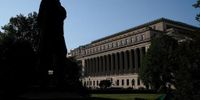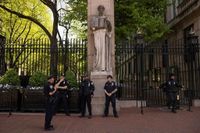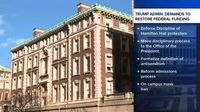Columbia University finds itself at a critical juncture as it navigates pressure from the Trump administration to meet a series of demands to reclaim $400 million in federal funding, a situation that raises serious questions about academic freedom and the university's future.
The Trump administration has been clear: unless Columbia agrees to a set of nine strict demands, it risks losing significant federal support. These demands include enforcing discipline for many involved in recent protests on campus, instituting a mask ban, and formalizing the definition of antisemitism, all of which the administration claims are necessary to protect Jewish students from harassment and empower campus police.
The university has until Friday, March 21, 2025, to come to an agreement and is already facing dire financial repercussions. Interim President Katrina Armstrong addressed the university in a letter, stating, "Responsible stewardship means we must consider every appropriate action, work with our partners across the nation, and we are doing so... But we will never compromise our values of pedagogical independence, our commitment to academic freedom, or our obligation to follow the law," a sentiment that highlights the university's commitment to its core educational principles amidst mounting pressures.
The backdrop to these demands is a series of protests at the university following the October 7, 2023, Hamas-led invasion of Israel, which resulted in an escalation of anti-Israel demonstrations. These protests have sometimes led to violent confrontations between supporters of the pro-Palestinian movement and those advocating for Israel. The administration alleges that the handling of these events has not only endangered student safety but also fostered an environment of harassment against Jewish students. As a result, Columbia currently operates without the federal funding that typically supports numerous programs and research initiatives.
The situation has drawn scrutiny both within the university and from broader academic circles. Many scholars and commentators are watching Columbia closely, noting its unique role as an institution that has traditionally welcomed diverse viewpoints and engaged in robust academic debate. Samuel Bagenstos, a law professor at the University of Michigan, expressed concerns that the actions of the Trump administration could set precedents damaging to higher education. He noted, "These actions by the administration do not comply with existing federal civil rights laws and severely impose on the independence of a private university to set its own policies regarding speech and scholarship."
The case also points to a larger national trend. Other institutions, like the University of Pennsylvania, are finding themselves under similar scrutiny for their policies and public stances, particularly regarding transgender issues and other contentious topics. According to reports, the Trump administration has opted for a hardline stance, rapidly moving from demands to threats of withdrawal of funding that many believe exceeds past administrations' cautious approaches.
Columbia’s response to the administration’s demands has been tepid thus far, with Armstrong reiterating a commitment to uphold the university's principles while facing the reality of financial constraints. She has called for deeper discussions about what it genuinely means to protect student rights without compromising academic integrity. Yet no specific details have been shared regarding how the university intends to tackle these demands against the backdrop of significant protests.
Legal analysts and university representatives emphasize that the administration’s rapid shift from discussions to threats of funding cuts could undermine the traditional cooperative relationship between universities and the government. They argue that prior administrations have generally sought constructive dialogue over confrontation, which raises concerns about the implications of this current approach.
Moreover, the fallout from this conflict is not just confined to Columbia. As the first university to confront such aggressive intervention by the Trump administration, the outcomes of this situation could set dangerous precedents for other institutions across the country. The prevailing fear among academics is that yielding to administration pressures could lead to a chilling effect across campuses, stifling free speech and difficult discussions that are essential for a vibrant academic community.
As the deadline looms, Columbia University stands at a crossroads: Should it submit to the administration's terms to reclaim essential funding, or should it challenge these conditions, potentially sacrificing more than just money but also risking its long-standing ethos of academic independence? The stakes are incredibly high, and the outcomes of this pivotal moment in American higher education could change the landscape of how universities interact with federal governance in the future.
As Columbia’s leaders reflect on their next steps, they must weigh the immediate financial necessity against the obstruction of their educational mission. Meanwhile, the academic community watches with bated breath, recognizing the profound implications of their decision for academic freedom and civil rights on campuses far and wide.







